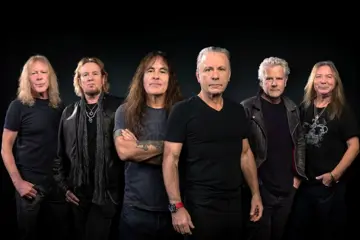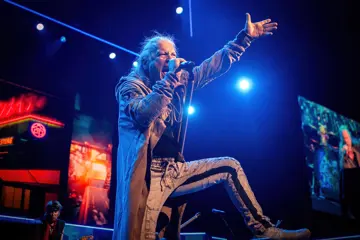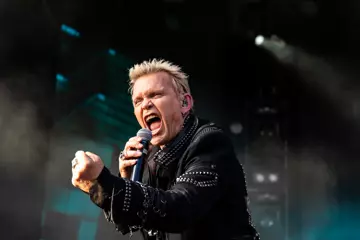“I'm in Las Vegas, I'm here with some friends, I'm between trips, and I'll be leaving here in about a week to come Down Under there and do a the festival for a few weeks. I'm looking forward to it – I was in Sydney one about ten years ago but I've never been to Melbourne, so I'm looking forward to coming down there.” Hayes sounds spritely and full of life on the phone, in the lead-up to his 68th birthday. He'll be heading Down Under soon to premiere his live performance of Midnight Express to Australia, where he'll be talking about his time in jail and provide perspective as he's gotten older.
Hayes actually released an autobiographical account of the events, titled Midnight Express, soon after he escaped, while Hollywood adapted the story into the 1978 film of the same name. Hayes believes that while the book and movie added different elements, his 'play' will tell the story in a more personal manner than ever before. “I'm 68 now, and I think I'm 18 until I get up and start moving around or look in the mirror, but I feel 18 and now it feels like the '60s again, I'm out travelling the world, which is what I did in the '60s, but this is all a bit different now, and I get a chance to talk about the whole experience with a bit of perspective on this. I kept thinking for a long time that people must be getting sick to death of hearing this story about Bily Hayes and the Midnight Express, but I realise there are a whole lot of folks, especially the newer generation who don't know the story; there are people around my age who kind of remember it and want to hear about it again, and for me, it's my chance as an actor to put it all into perspective and talk about it. Everybody's been down in a deep hole somewhere, trying to find their way out – mine's just a little bit more concrete and dramatic. But everyone's been there: hopefully I can offer some inspiration and encouragement to this story. Humour is the way I survived through life and in jail, so I've tried to put in as much humour as possible. People are like, 'Ooooh, Midnight Express, that's dark' – no, it's not! Yeah, it's not light comedy, but within it, there are a lot of colours and I try to put humour in places – you have to. My own grandmother said, 'It's a wonderful life if you don't weaken,’ and she lived to be 101, and that's how I'm feeling. I never thought I was going to see 30, so everything after that is just gravy for me. Of course, I met my wife in 1978 when the movie first came out and we've been married for 35 years. Getting busted and going to jail was the worst and best thing that's ever happened to me.”
Realising he wasn't going to be extradited (although Hayes wasn't allowed to travel, however, for 20 years), certainly changed his perspective on life. For Hayes, it's all been for the better. “There are still things about jail I learn stuff about. It's forced me to learn about strengths and weaknesses and there are things I learnt in jail that have held me in good stead for the rest of my life. My dad's gone a few years now but one of the things he used to say was, 'The nice thing now is that we don't sweat the small stuff anymore.' I start thinking or moaning about the agent not calling or I didn't get the money or this didn't happen or whatever, I just have to slap myself in the face and say, 'You're thinking about the small stuff; I'm healthy, I'm free, my wife still loves me, nobody's beating my feet – everything is gravy.’ And that's a perspective that's very valuable to hold.”
Hayes has certainly profited from his time in prison, much thanks to his published works – his latest was released just a couple of years ago. “[I wrote] the original book Midnight Express, the sequel Midnight Returns, which talks about everything that happened afterwards, and later I put out The Midnight Express Letters, which is all the original letters I sent and received from people. That to me, is really interesting. The other two were written as books, but this is just letters that could go out past the bars where I couldn't go, and all my friends kept them, gave them back to me after I escaped, and I used them to write the first book. I put them in a box in the attic and then five years ago my wife made me clear out the space so I was ready to throw this box away, and my wife was like, 'No!' I ended up kind of reorganising and annotating these letters and putting then in a form. If you want to know what prison really feels like from the inside, these letters say it. Rereading them sucked me right back in there; I could smell the place and feel the blankets.”
Don't miss a beat with our FREE daily newsletter
It's fascinating to hear the run of events, particularly considering things could have turned out so differently for Hayes, who was a student at the time of his capture. He believes he would have gone to jail regardless, but the worst part of the ordeal was having to explain to his parents what had happened. “It's weird, because I was a writer – I was at university in Milwaukee, I'd gone to Journalism school, I wanted to get out into the world and experience life so I could write about it. Well, surprise surprise, turns out I did, just not the way I thought. Truth is, I made three successful smuggling trips, smuggling hash – marijuana, for those who don't know – I was caught on the fourth trip. If I hadn't been arrested on the fourth trip I would have crashed up against the wall someplace else because I wasn't thinking, I wasn't taking any responsibility for my actions. After I was arrested, suddenly they gave me a pencil and paper and had me write a letter home to my parents – that's when it really struck me in the face, I couldn't avoid it anymore, what I'd just done. Not only had I screwed up my life, but I'd put my parents in there. And they were there every night while I was there, and it was the most difficult thing for me to deal with, and I'm still dealing with it. I talk about it in the show: writing that letter home to my parents knowing what that letter was going to do to them when they read it, the pain it was going to cause...” Hayes takes a second to deeply inhale, “... phew.”
Despite learning a tonne of life lessons in prison and the years after, Hayes is and has for a long time been strongly opposed to the imprisonment of drug takers and dealers. “I have a medical marijuana license in California, I think it's just logical, and the hypocrisy for putting people in jail for drugs is – especially for marijuana, which the medicinal purposes are very positive – to put people in jail doesn't make any sense. If you're gonna smoke anything, marijuana is the least harmful. If you want advice, don't smoke cigars, don't drink alcohol, do yoga everyday. That's what I've done for the last 40 years.”
Hayes takes it a step further and makes his case for the legalisation of not just marijuana, but all drugs. “I think they should all be legal; you should put all the money that's put into enforcement and putting people into prisons, and use it to educate these kids about what drugs are and what the effects are because they're going to make their own choices anyway, and we should have treatment centres for people who want to try and clean their acts up. Heroin should be legal and it should be free and it should be given away by the government, which eliminates all of that violence. They're plants growing in the ground, they're cheap – the moment you make them illegal, up goes the price, and the violence comes in. Legalise them all; it's going to cause its own problems, but no where near the problems that are happening now, and the imprisonment that's happening and the violence that's happening – you can get rid of a lot of that by legalising drugs. A lot of countries are beginning to try it now. Will it create other problems? Sure, but you deal with those problems, you don't imprison people, and you don't have people out there with guns breaking into your house because they need your money to get their fix.”
Our talk moves to the Bali Nine inmates on death row. “Truth is, I feel really bad for these guys because it seems like their options have been used up. Now it's just, I don't know what's going to save them now. Something, I hope. The government in the Philippines and Malaysia and all these other places, they have these Draconian penalties, they smoke more cigarettes than any other country in the world, and imprison people for pot, and heroin – I mean, heroin is a really nasty drug. There's a lot of drugs, some are better or worse than others – I don't think you should be arrested or imprisoned for any drug; you're putting it in your body! If it's cheap and legal, they can head down to the clinic to get their fix somewhere. But that's a long way off, and while we're talking about it, those poor guys are looking at death. I wish there was something we could do to help them, I just don't know what at this stage. People are all up about drugs, and you know, something like, 'My daughter just died of an overdose' – I'm sorry to hear that. Maybe she wasn't educated, maybe she should have been told the truth about drugs. People tell you if you smoke a joint, it's the path down to Hell and the next thing you'll be sticking a needle in your arm, then you have a few joints and you realise, that's not true, and then you ignore everything else that your parents or anyone else has told you about other drugs that are dangerous. Meth is really dangerous; heroin is a really dangerous, addictive drug; alcohol and tobacco are dangerous drugs, but they're socially acceptable – the whole thing about drugs is a very big issue. I just feel really bad for these guys and their parents, I know what their parents are going through and I wish whatever good things can happen to them.”















